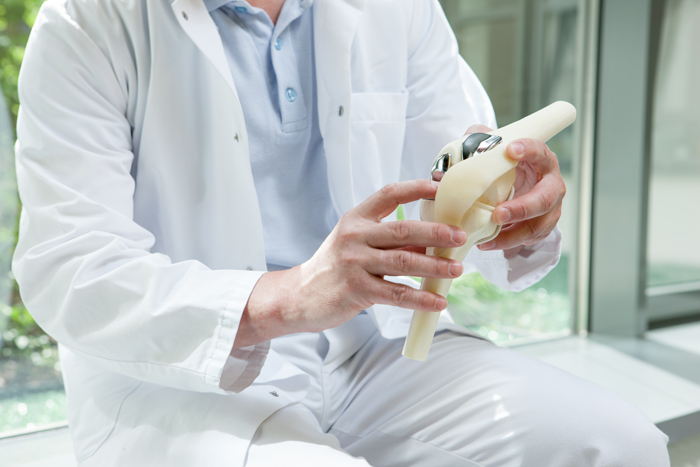Introduction
Orthopedics is a field that deals with the bones, joints, and cartilages and the conditions and abnormalities in them. Joint replacement is a fairly standard procedure in people who have arthritis and brittle bones because of old age.
In orthopedics, joint replacement is defined as a surgical procedure wherein the damaged/ arthritic parts of a joint are removed and replaced with a plastic/metal or a ceramic-based device. The device is termed a prosthesis, and its function is to replicate the movement of a healthy and normal joint.

When should you consult a healthcare provider regarding joint replacement?
If you have multiple conditions that cause significant distress and problems to the joint, then it is a good idea to pay a visit to your physician. The pain that is then caused damages the cartilage that surrounds the bones as well. This happens because of arthritis or fracture, or any other joint immobility condition. In such cases, when the individual is not relieved from pain and discomfort even after the medicines, physiotherapy, and modifications to the activities, then your healthcare provider may recommend this procedure.
Request an appointment at Apollo Spectra Hospitals, Tardeo, Mumbai
Call 1860 500 2244 to book an appointment
How should one ideally prepare for the surgery?
The team of doctors, surgeons, and occupational therapists will spend a considerable amount of time prepping the individual up for the surgery. The preparation includes blood tests, physical examinations, and cardiograms. This is done to effectively plan/chart out the surgical procedure,
There are multiple things that one can do to prepare them for this surgery. It is essential to keep doing light exercises and consume a healthy diet before the procedure. After the surgery, one must avoid any kind of strenuous activity for the first few weeks. You should also do multiple normal activities like showering or climbing stairs with the help of some assistance or support.
What exactly is done in the surgical procedure?
The surgery involves making an incision at the targeted joint. The dysfunctional or damaged cartilage and bone are removed. After their removal, a prosthetic/artificial support made out of plastic/ceramic/ metal is fitted. After the fixation of the prosthetic, the joint is kept under observation. It is a reasonably successful procedure, and the individuals will feel as though the fitted prosthetic is completely behaving like a joint.
What are the common joint replacement surgeries?
These are some common joint replacement surgeries-
- Knee joint replacement surgery
- Hip joint replacement surgery
- Elbow joint replacement surgery
- Shoulder joint replacement surgery
- Ankle joint replacement surgery
What are some risks and complications that are associated with the procedure?
Although this is deemed a generally safe open surgical procedure, like with any surgery, it has its own risk and complications. Some may occur during the surgery, and some may occur during the recovery period post-surgery. The complications include-
- Infection
- Clotting of blood
- Injury to nerve
- Loosening of prosthesis
- Dislocation of prosthesis
What is the long-term recovery outcome or results of the procedure?
Most of the patients perform multiple activities in their daily life easier after the surgery is performed. The results and outcomes of the joint replacement surgery may last for many years after the procedure is performed.
The rehabilitation and recovery process differs in all individuals post the surgery since it depends on multiple factors. Your healthcare provider will ask you to use the joint after the operation is performed effectively.
Some people also experience mild pain in the joint that is replaced and in and around it. This happens because the muscles that are present in the surroundings start becoming weak from their disuse. The pain automatically resolves itself in a few months.
Conclusion
Total joint replacement surgery is performed to increase the mobility of the dysfunctional joint in the body. It is critical to perform some light exercises specifically described by your physiotherapists to increase joint strength and restore the functionality and movement of the joint. You should stay in touch with your healthcare provider throughout the recovery process to keep track of your joint flexibility and recovery.
The signs of an infection post the surgical procedure are multiple, and they are-
- Infections
- Fever
- Redness
- Swelling
- Tenderness
- Numbness
- Discharge
Yes, there is a probability or risk of non-functionality of the replaced joint. This happens when there is excess pressure that is present on the joints because of strenuous activities. Hence you should consult with your healthcare provider regarding the same before starting it.
Before joint replacement surgery, patients should maintain a diet that includes: fruits, vegetables, grains, lean meats, fish, poultry, low-fat dairy products, or other protein sources.
Our Top Specialities
NOTICE BOARD
CONTACT US
CONTACT US
 Book Appointment
Book Appointment


.svg)
.svg)
.svg)
.svg)








